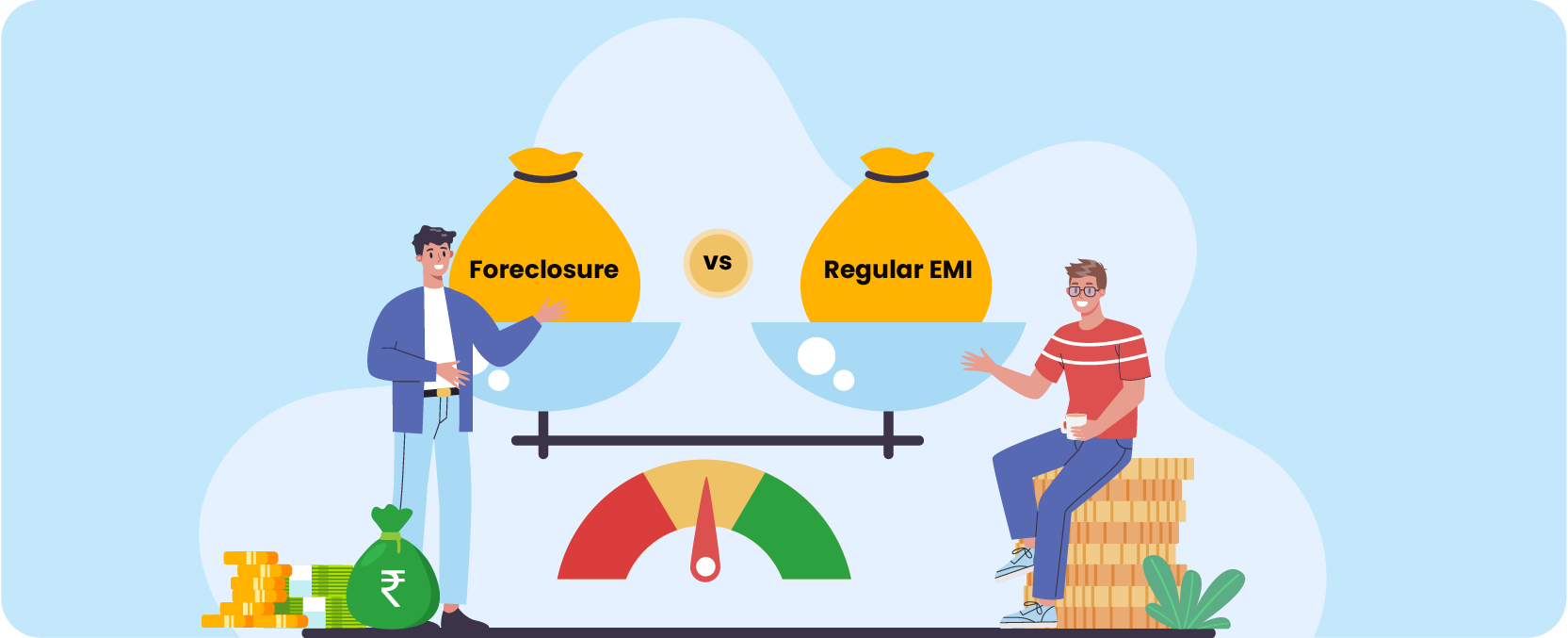- Published on: 14 Jul 2025
- Last updated on: 6 Feb 2026
- Post Views: 13880


Personal loans are one of the most popular borrowing options for individuals in India. Whether it’s for medical expenses, weddings, education, or home renovations, personal loans offer quick access to funds with minimal documentation. Once you take a loan, you face two repayment choices: Should you prepay the loan, paying off the remaining balance at once? Or should you stick to the regular EMI payments until the end of the loan tenure and use the lump sum amount for an investment?
This blog will help you understand personal loan prepayment vs. regular EMI payments, their benefits and drawbacks, and when each option makes sense.

Prepayment/ Foreclosure of a personal loan means repaying the entire outstanding loan balance at once before the end of the loan tenure. Borrowers usually choose to foreclose their loan when they get some extra money, like a bonus, returns from investments, or other savings.
Prepayment Penalties:
Also Read: Top factors that affect your credit score?
EMI (Equated Monthly Instalment) is a fixed monthly payment that covers your loan’s principal and interest components.
How EMIs Work:
Calculate your EMIs: Personal Loan EMI Calculator
Also read: Tax benefits on personal loans

Investing your lump sum instead of foreclosing your personal loan may initially seem risky. Still, it offers the opportunity for higher returns than the interest savings from paying off the loan early. Here’s a deeper look at how different investment options could benefit you:
One of the advantages of investing a lump sum amount instead of using it to foreclose a personal loan is the power of compounding. Compounding allows you to earn returns on your initial investment and the accumulated interest.
For example, following the above example, instead of foreclosing the loan two years before the 5-year tenure ends, if you invest ₹ 2,91000 in a mutual fund with an average return of 11% annually. With annual compounding, your investment would grow to ₹3,62000 in 2 years, even without additional contributions. You will earn an interest of ₹ 71,245.

| Scenario | Foreclosure Makes Sense | EMI Payments are Better |
| Loan Interest Rate | High | Low or moderate interest rates |
| Investment Opportunities | No better investment options are available | Available investments with better returns (12% or higher) |
| Cash Flow Flexibility | Stable income and surplus funds | Need to maintain liquidity for other financial goals |
| Prepayment Penalties | Minimal or waived after 6-12 EMIs | High prepayment penalties |
| Goal | Aim to be debt-free earlier, reduce liabilities | Prefer to build wealth through investments |
Choosing between personal loan foreclosure and regular EMI payments depends on your individual financial goals, the loan terms, and available investment opportunities. Always evaluate the loan’s prepayment benefits, penalties, and opportunity costs before making a decision. Use a loan prepayment calculator to understand your savings. For personalised advice, consult a financial planner.
1. What is personal loan prepayment/ foreclosure?
Personal loan foreclosure refers to the early repayment of the entire loan amount, including the principal and accumulated interest, before the loan’s tenure ends.
2. Which is better: Foreclosing a personal loan or paying through EMIs?
Loan foreclosure can save you money on interest, especially if the interest rate is high. However, it may come with penalties, and not everyone may have the available funds to make an early repayment. Paying through EMIs, on the other hand, allows you to manage your cash flow while making gradual payments; however, you’ll end up paying more in interest over time.
3. What are the penalties for prepayment/ foreclosing a personal loan before the tenure ends?
The loan foreclosure penalty amount can vary, but typically ranges between 2% and 5% of the outstanding loan amount. However, some lenders may offer no foreclosure charges after a specified period of repayment, such as six months or a year.
4. Can I foreclose my personal loan anytime?
Your loan agreement determines when you can foreclose. Most lenders allow loan foreclosure after a specific period (e.g., 6 months or 1 year of loan repayment).
5. Are there any tax benefits for foreclosing a personal loan early?
Generally, there are no direct tax benefits for foreclosing a personal loan early. Unlike home loans, personal loans do not qualify for tax deductions on interest payments.
| Personal Loan of Different Amounts | ||
| ₹50,000 Personal Loan | ₹1 lakh Personal Loan | ₹2 lakh Personal Loan |
| ₹3 lakh Personal Loan | ₹4 lakh Personal Loan | ₹5 lakh Personal Loan |


